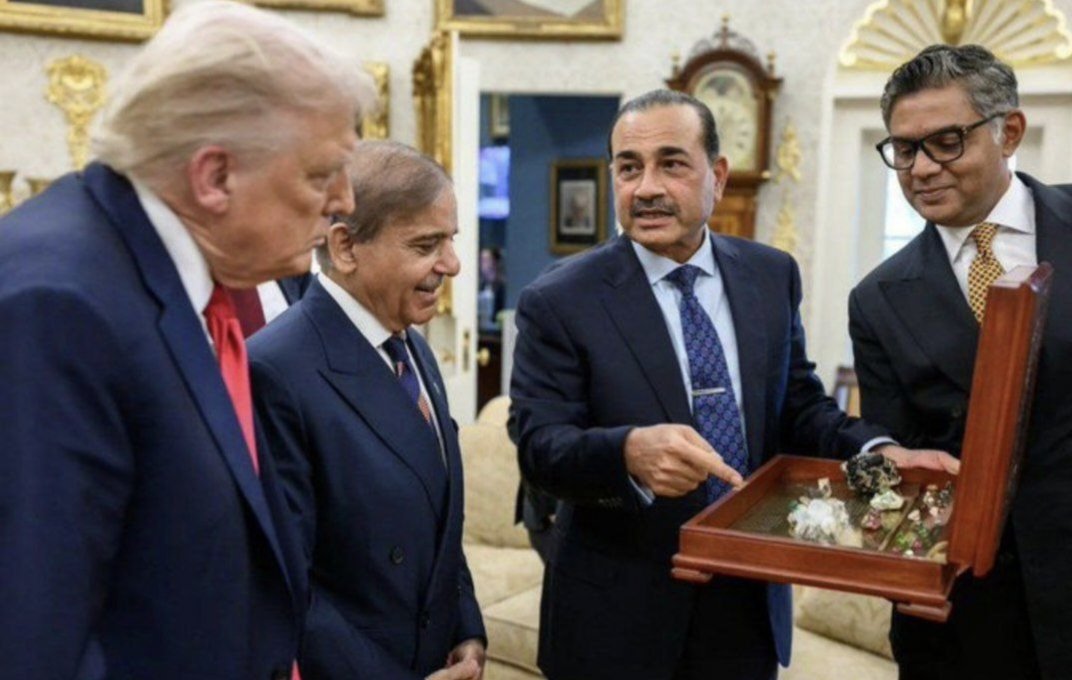Rudradev wrote: ↑02 Oct 2025 22:25
Pakistan is trying very hard to play both sides of the US/China equation. They are hoping to get as much mileage out of Trump's favour (based on the centrality of his family-owned WLF cryptocurrency fund to laundering TSPA/ISI's criminal wealth) while he lasts, and meanwhile probably telling the Chinese that their renewed relationship with Trump is for temporary gain while the Iron Brotherhood is strategic and permanent.
Excellent analysis Rudradev ji. Let me add my thoughts.
This Pakistani behaviour is also from its traditional playbook, but there are two differences, one at the US end and the other at Pakistan's.
In the case of the US, earlier administrations which tolerated such Pakistani behaviour did so under their geopolitical strategy which was a continuum under both Democrats & Republicans. Now, that's not the case, it is Trump's unabashed personal aggrandisement just like how the Nazi leaders plundered artefacts & other stuff from defeated countries. From a distance, it looks more and more like the Third Reich, no less. Trump considers the Boeing, cryptocurrencies, mining agreements, Trump Tower concessions as justified
ghanimat.
At the TSP end, the situation is not the same as it existed in the 1960s thru' early 2000s period either, when the US and China secretly colluded to destroy the USSR, a common enemy. Today, they are at each other's throats as they vie for the sole superpower/hegemon status - the US trying desperately to cling to that status from slipping away while the upstart China sees once in a two-millennia chance to achieve
tianxia. Any attempt to play one against the other in the present circumstances would be only short-lived, if at all, unlike the four decades it lasted during Cold War 1.0.
. . . compelling the Taliban to give USA access to Bagram airbase. Not only are the Taliban unlikely to cooperate with Pakistan on this, but the Chinese will consider this a major redline if crossed. So it's already proving to be a delicate balancing act for the Pakis.
The Paki-Taliban relationship is at its nadir. At this time, India has a far better chance of persuading the Taliban to lease out Bagram to the US ! What a turn of events !! Of course, India would reject any such request from the US in the context of the current state of affairs. It would at least have been different had INDO-PACOM or the Quad deliberated such a facility with India. Bagram, coming under CENTCOM, wouldn't be in India's interests at all.
The Taliban FM is coming to ND next week, BTW.
A new ingredient in the recipe is the Saudis cashing in their chips with respect to Pakistan's nukes. The Saudi-Pak agreement-- I believe-- is about Riyadh getting direct access to whatever Paki nukes exist, and nothing else.
The rightful owners are claiming their property. They had only given Power-of-Attorney and they have just revoked that.
The Pakistani military was IN ANY CASE offering itself up as a rented thug force for the Saudis-- Rawheel Sharif himself was in command of the cannon fodder KSA was sending into Yemen, a conflict he handled with the usual panache of Pakistani military expertise. So there is no question of KSA needing this deal to get the Pakistanis to act as their chowkidars. On the other hand, the Saudis have neither the capability nor intent to tangle with India in case of another Op Sindoor.
The hold that KSA has on TSP is phenomenal, something that even China doesn't have. It stems from most Sunni Pakistanis considering Saudi Arabia as their Holiest Land and the 'Custodian of the Two Holy Mosques' as their legitimate Caliph.
Just yesterday, the US has done a PAKISTAN on Qatar declaring 'attack on one is attack on both'. IMHO, both deals are useless but may give KSA & Qatar, whose armed forces are plain useless & humbug, a false sense of security.
Pakistan never sent its military to fight the Commies despite multiple requests from the US under CENTO & SEATO. Ayub Khan said that India was a bigger enemy than the Commies and he was protecting American interests that way! Despite the deference that TSP has for KSA, it refused to send its military to fight the Houthis in c. 2015. To mollify KSA, Gen. Rahil Sharif was sent, which testifies to the pathetic state of the West Asian armed forces that they accepted this guy to lead their combined command of Islamic forces. After the Makkah Siege of 1979, Pakistani forces protect the Al Yamamh Palace in Riyadh and also protect the Royalty. In the 70s, a certain Brig. Zia-ul-Haq cleaned up the Palestinian refugee camps in Jordan killing more Palestinians than by Israel in all its operations put together. TSP continues to offer some semblance of military training to some of these countries. So, there is history of these KIngdoms depending upon TSP.
As for Qatar, the inward-looking US (more with Trump now) has no intention of 'protecting' it unless its Al-Udeid base is attacked.
As I had said in another context, the India-Saudi relationship turned very positive after King Fahd, Prince Saud bin Faisal (FM) and Prince Sultan (Defence Min.) disappeared from the scene one after another and King Abdullah took over. Contrary to public perception which depicted him as an Islamist hawk and hence would be difficult for India, he turned out to be just the opposite. The relationship has never looked back after that. UAE which acts on cues from KSA has gone several steps ahead in its relationship with Bharat. MBS is a shrewd guy and he has already removed Wahhabism from internal governance. He wouldn't do anything that would damage the India-KSA relationship.
There is no love lost between KSA & Qatar with the latter protecting all the Islamist forces from Muslim Brotherhood, the Hamas, to the Iranians and the Houthis who are all dead against the Saudi Royalty. The respective military pacts by KSA & Qatar may be more for internecine wars or skirmishes or attacks from Iran (in the case of KSA), if at all, than for external attacks. Most certainly, how can Pakistan prevent an Israeli bombing of Riyadh or Jeddah or Dhahran? It is far beyond their capabilities. OTOH, it can, at the most, supply some missiles to KSA though TSP may not be willing to earn the wrath of Israel for doing so. It may not have much option, though.
What was in it for Pakistan when they signed the Saudi-Pak deal? Money, of course. Some have speculated that KSA could be a deniable conduit for the US to supply weapons to Pakistan after the miserable failure of its Chinese armaments during Op Sindoor-- but even under Trump, this is not a pipeline the US will happily open without Pakistan meeting hard benchmarks of performance, one of these being Bagram airbase.
I agree that KSA would not act as conduit for US military hardware to TSP. One of the reasons is the extent of India-KSA relationship. Secondly, KSA cannot subsidize large military purchases for and on behalf of TSP any longer. Thirdly, for its part, the US is no longer willing to fund such military sales under some pretext or the other as it used to do earlier, when it is urging its alliance partners to pay more for its stationed troops and also up their defence spending to 5% of GDP.
The responses of Iran and Israel to the KSA-Pakistan deal are even more interesting. Iran has made a statement "welcoming" the defence agreement-- why? Is it to put a brave face on the inevitable, or do they see an angle by which they (and their allies in Beijing and Moscow) end up benefiting from it?
Probably Iran wants a new 'Baghdad Pact', this time Islamist forces joining against the Great Satan and its Minion Satan in the region. That way, it will ensure that the KSA-TSP pact is not directed against it and it can influence the direction it takes too. The China-Russia axis would then have wrested West Asia from the increasingly tenuous US control, though I do not believe that there is such a Grand Strategy as such behind this pact and Iran's reaction. Iran might also see it as a last chance to destroy Israel, its stated though impotent goal.
Pakistan in all this will probably insist that KSA's authority over Paki nukes remain "recessed" and not publicized, because being open about it will deflate one of their last remaining claims to exceptional status... that of being the "sole Islamic nuclear power".
Yes, neither KSA nor TSP would see it prudent to advertise anything at this stage. What is increasingly becoming clear is that India lives in the most dangerous neighbourhood where Islamist jihadi terrorism amidst a wideespread nuclear overhang and NATO-like alliance are becoming a real possibility. Apart from this, it is situated bang in the middle of a continent which has the largest number of NWSs, wannabe NWSs, and rogue NWSs. It is imperative for India to immediately allocate 4 to 5% of GDP for defence.


